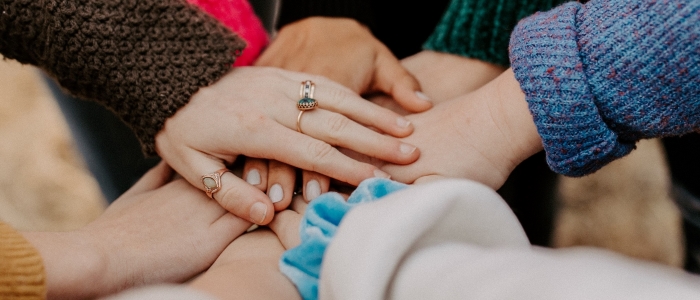Explore
Questions?
Undergraduate Chair
Dr. Cristina Caracchini
Undergraduate Assistant
Erika Gu
undergraduate_lc@uwo.ca
Academic Counselling
519-661-3043
arts@uwo.ca
Community Engaged Learning

Community Engaged Learning (CEL) is an educational approach that integrates service in the community with intentional learning activities. Within effective CEL efforts, members of both educational institutions and community organizations work together toward outcomes that are mutually beneficial.
About
Community Engaged Learning at Western aims to connect classroom with community in a way that is mutually beneficial to all participants: students, faculty, and community partners. We believe the community can contribute in multiple and meaningful ways to student learning objectives. In addition, Western students can contribute knowledge and skills toward developing sustainable solutions for community-identified needs. At Western, we provide a variety of experiential learning opportunities that give students important opportunities for practical application of classroom learning. CEL courses offer additional benefits to students such as increased sense of civic engagement and the chance for their academic work to make a positive impact in local and global communities.
CEL offers a number of valuable benefits to students, including:
- Meaningful connections to local and international communities
- Context to apply academic learning outside the classroom
- Hands-on experience to aid in building a resume
- Development of critical thinking skills
- Enhanced understanding of diverse cultures and communities
- Opportunities to learn/practice transferable skills including communication, teambuilding, and problem-solving
- Increased sense of civic engagement and social responsibility
Local CEL Opportunities
Course: Intercultural Communications 2500F/G: Bridging Classroom and Community: Languages & Cultures in Action (cross listed with CLC/Italian/German/Spanish 2500G)
Faculty Member: Amrapali Chatterjee
Term Offered: Winter 2022
Course Description: By engaging with critical and creative explorations, we will investigate issues of identity, memory, immigration, prejudice, stereotype, and intercultural dialogue. Students will be involved in collaborative projects with members of the London community, to document the richness of its cultural diversity. Students are placed with a variety of community partners, such as language schools, social clubs, old age homes, and/or cultural centers, where language, identity, and memory interact socially in dynamic, but diverse ways. Students engage one-on-one with members of these community organizations, or the people that they serve, so that they may shadow, observe, and participate directly in community partner initiatives. By recording audio and/or visual interviews with their community partners, students will be able to enrich London’s local history and at the same time, bridge theory and practice of intercultural communication and competence within the Arabic, Hispanic, German, Italian, and Japanese communities. These languages are part of the Languages and Cultures department offerings.
Course: Spanish 2200: Intermediate Spanish & Spanish 3300: Advanced Spanish Language
Faculty Member: Dr. Alba Devo Colis
Team Offered: Fall and Winter Terms (1.0 credit)
Course Description: Spanish 2200: Combining grammar and communication this course prepares students to discuss, read and write about a variety of topics and to explore ideas about Hispanic culture in relation to their own. Includes an optional Community Service Learning component. Spanish 3300: Further development of oral and written skills with systematic acquisition of vocabulary and selective grammar review. Based on a multimedia and communicative approach, this course aims to develop fluency. Discussions, readings, and writing will focus on the cultures of Spanish-speaking countries. Includes an optional Community Service Learning component.
Course: Spanish 3319A: Second Language Acquisition (cross listed with Linguistics 2244A)
Faculty Member: Dr. Olga Tararova
Term Offered: Fall 2021
Course Description: An overview of research on naturalistic and instructed second language acquisition (SLA). Various aspects of first language and second language learning/acquisition processes provide a framework for consideration of basic questions in SLA. Issues considered include situational factors influencing SLA, learner differences, and cognitive processes in learning a second/foreign language. The course will match students up with members of the London and Western community who are endeavouring to learn a second language.
International CEL Opportunities
Course: Spanish 1030: Spanish for Beginners
Faculty Member: Dr. Alba Devo Colis (Course Coordinator)
Term Offered: Fall and Winter Terms (1.0 credit)
Course Description: Using traditional and communicative practices (songs, videos, films, games) this course prepares students to interact in a daily life context and provides the foundation for continued studies in Spanish. Designed for students with little or no knowledge of Spanish. Includes a Community Service Learning option in either the Dominican Republic or Cuba (on hold for 2021-2022 due to COVID-19).
Course: Spanish 2200: Intermediate Spanish & Spanish 3300: Advanced Spanish Language (Intermediate and Advanced Spanish: Cuba CEL)
Faculty Member: Dr. Alba Devo Colis
Term Offered: Fall and Winter Terms (1.0 credit)
Course Description: Combining grammar and communication this course prepares students to discuss, read and write about a variety of topics and to explore ideas about Hispanic culture in relation to their own. Includes a Community Service Learning trip to Cuba over Reading Week (on hold for 2021-2022 due to COVID-19).
For more information, contact Dr. Victoria Wolff or the Undergraduate Assistant.






